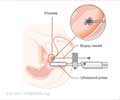Limitations of PSA Testing in Prostate Cancer
Despite its immense benefits, the PSA test has its limitations in diagnosis of Cancer Prostate.
As the natural history of prostate cancer is still not fully understood, there is a great controversy about treating all prostate cancers. Many of these cancers that occur remain indolent and never manifest themselves. Most patients over the age of 70 years die due to causes other than prostate cancer. The lifetime risk of dying due to prostate cancer in a man who has the disease is less than 10%. This is unlike other cancers like lung or breast cancer, where the risk of dying of the cancer is almost 95%.
In all, the PSA has its own limitations. These are as follows:
- These tests can start treatment for a cancer that does not require to be immediately addressed, for which a wait- and-watch policy is better suitable.
- False +ve PSA results can evoke unnecessary panic, especially in someone without any malignancy.
- False –negative tests are when the PSA values are normal even when cancer is present. This can cause neglect of the disease in a person in whom it needs to be addressed.
- It is yet not clear if the benefits of this test far outweigh the risks involved in cancer treatment.
- Increased PSA values might prompt further diagnosis. Some of the diagnostic techniques employed for prostate cancer diagnosis can be painful while others may be harmful and can even cause bleeding.
- PSA tests have limited use when it comes to detecting tumors that are fast -moving and metastasized.

![Prostate Specific Antigen [PSA] & Prostate Cancer Diagnosis Prostate Specific Antigen [PSA] & Prostate Cancer Diagnosis](https://images.medindia.net/patientinfo/1920_500/prostate-specific-antigen.jpg)








